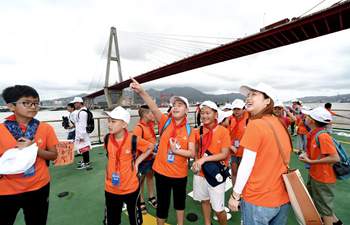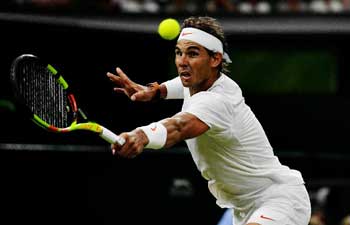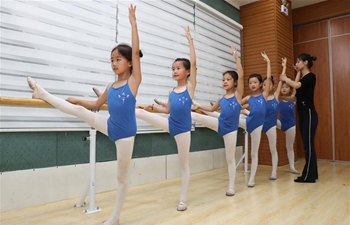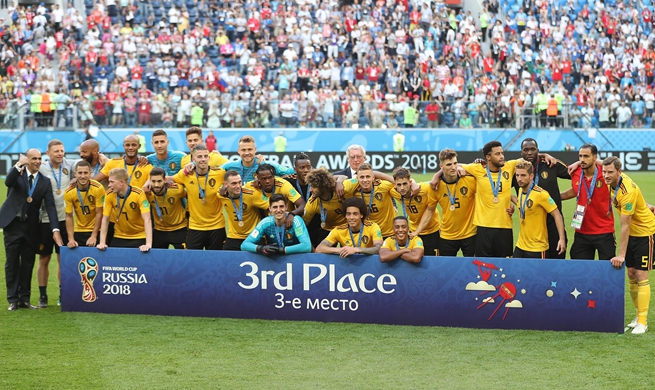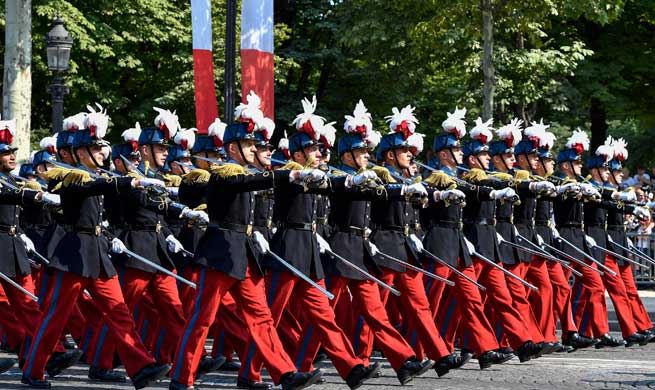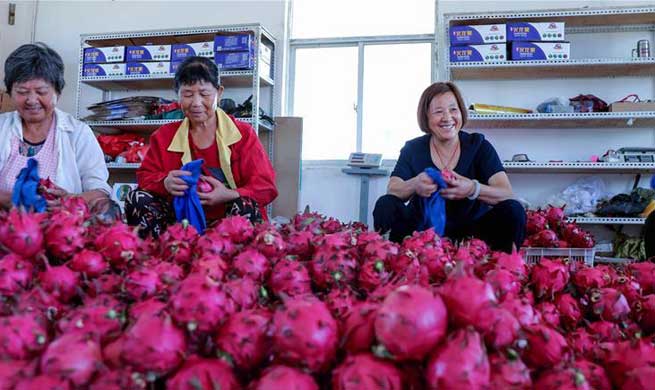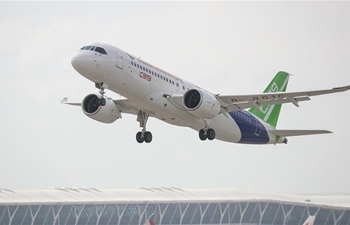By Michael Place
MOSCOW, July 14 (Xinhua) -- China's national football team might have been out of sight on football pitches during the World Cup in Russia, but the country certainly hasn't been out of mind.
Chinese fans and sponsors have given the Asian nation an ubiquitous presence during the June 14-July 15 competition. The country's growing importance in the football world is also exemplified by the slew of China-based players featuring in 2018 World Cup squads.
Whether draped in the country's flag, dressed in China shirts or face painted in the national colors, Chinese fans have been unmistakable in Russia over the past five weeks, flocking to matches in each of the World Cup's 11 host cities.
Chen Gang was one who made the trip to Russia and the moment he landed in the country he began to post pictures on the social network Wechat.
"Many of my friends are jealous about my travels, joking that I'm a nouveau-riche 'Tuhao'," Chen said. "The four-day trip, including tickets to see Argentina versus Iceland and Germany versus Mexico, cost me 15,000 Yuan (2,250 US dollars). But I'm OK with the price and satisfied with the trip."
"On streets, in bars, in stadiums, I could see the red Chinese national flag everywhere," added Chen. "As the popular internet saying goes, everyone in China has come to the World Cup except the national team."
Zeng Yiming, a Chinese e-commerce entrepreneur, was so excited about his World Cup trip that he kept a diary documenting the occasion. At the Argentina versus Iceland match, he displayed his split loyalties:
"I couldn't cheer for my home team so I painted the national flags of both China and Argentina on my face, which seemed a bit embarrassing. Many Argentine fans asked me why the Chinese are here."
After the game between Germany and Mexico, he wrote: "There were four disabled Mexican fans sitting on the chairs behind me. They hugged each other, and cried out aloud 'Mexico, Mexico!' I was so touched, thinking how I would react if China beat the defending champions. That joy, once in a lifetime, would be enough for me."
If hordes of fans decked out in the red and yellow of China's national flag aren't a big enough reminder of the country's deep-rooted connection with football, the competition sponsors have rammed home the point.
Among official backers of Russia 2018 are property and entertainment conglomerate Wanda, technology firms Hisense and Vivo, and dairy company Mengniu.
The brand names and logos have been omnipresent throughout the tournament; whether in the form of TV ads, billboards, pitchside advertising boards or display tents at venues and key tourists attractions such as Red Square.
"Chinese companies spotted the opportunity for a relatively cost-effective way to get their brands in front of billions of global eyeballs," said Simon Chadwick, professor of sports enterprise at Salford University in the UK.
Russian restaurants have also been given a Chinese flavor after local suppliers imported 100,000 crayfish from Hubei province for the event.
In addition, this World Cup has provided further evidence that China is an ideal place for the world's elite footballers to ply their trade. Some nine players who participated here are contracted with Chinese clubs, including Brazil's Renato Augusto, Argentina's Javier Mascherano and Belgium's Yannick Carrasco.
The Super League's high level of representation proves the competition is becoming stronger and should no longer be seen as a poor cousin of the best leagues in Europe and Latin America.
That was emphasized last week when Brazil midfielder Paulinho rejoined Guangzhou Evergrande on loan after a successful season with Barcelona.
But China is not satisfied with merely flexing its muscles off the pitch.
Moves are afoot to guarantee the participation of the national team at future World Cups. China's only appearance in the tournament until now has been at the 2002 edition in Japan and South Korea.
Marcello Lippi's side appear destined for a change of fortunes in the near future as government efforts to develop the game locally begin to take effect.
Football has been a compulsory part of school curriculums for several years, coinciding with the opening of tens of thousands of football-themed schools.
A reform and development plan introduced in 2015 outlined a roadmap for success. Its key aims were to promote effective management, expand the number of professional clubs and top-level leagues, strengthen the national team and ramp up investment in grassroots football.
In addition, the Chinese Football Association (CFA) was separated from the State General Administration of Sports. The CFA now enjoys more autonomy over its finances, personnel management and matters directly related to football.
The aim is not only to qualify for the World Cup, but to one day win it.
"It is a pity that we missed out on a play-off spot by just one point, it was so close," Chinese football chief Cai Zhenhua said of China's 2018 World Cup qualifying campaign. "I should say that our boys impressed the fans with their tenacious fighting spirit. We know there is a big gap between the world's best and us, and that's what we are fighting for."
Cai stressed that he expects Team China will improve ahead of qualifying for the 2022 World Cup in Qatar. And he vowed that the team will not be dispirited by past disappointments.
"We cannot neglect our progress just because of several losses," he said. "We made the final round of qualifying for this World Cup, that says that we are close."
Cai cited the team's recent rise in the FIFA world rankings as reason to be optimistic. China are currently 75th, up from 97th at the end of 2014. In October last year the team climbed to No. 57, their highest ranking since reaching 54th place in 2004.
Li Yuyi, vice-president of the Chinese Football Association said there is still a long way to go for the country to reach its targets. "Chinese football is not competitive enough internationally now," Li said. "We must set a goal and a pragmatic agenda to follow up."
Qualifying for the 2022 World Cup would seem like a good place to start.





